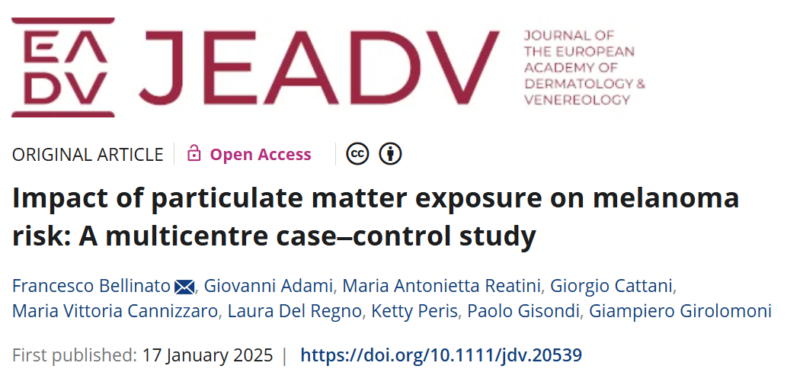
Justin Stebbing: Air pollution may protect against skin cancer, but the health risks are far more serious
Air pollution is a serious issue for our health, and it affects us in more ways than most people realize.
The study authored by Francesco Bellinato and colleagues, published in the Journal of the European Academy of Dermatology and Venerology on January 17, 2025, showed a protective effect of higher levels of particulate matter exposure (PM10 and PM2.5) on the risk of developing melanoma.
Impact of particulate matter exposure on melanoma risk: A multicentre case–control study
Authors: Francesco Bellinato et al.

The study involved 2,575 participants, including 1,473 melanoma patients and 1,102 healthy controls, all attending Dermatology Departments at University Hospitals in North and Central Italy. Researchers collected demographic data, smoking habits, history of sunburns, and skin type information.
They also estimated the levels of PM10 and PM2.5 exposure for each participant’s residential address using a Bayesian hierarchical model, which provided daily concentrations at a 1 km² resolution from 2013 to 2021. Logistic regression analyses were conducted to assess the link between particulate matter exposure and melanoma risk, while adjusting for potential confounding factors.
The study’s findings revealed a protective association between higher PM10 and PM2.5 levels and a reduced risk of melanoma. Specifically, higher levels of PM10 (OR = 0.89, 95% CI: 0.86–0.92, p < 0.001) and PM2.5 (OR = 0.72, 95% CI: 0.68–0.76, p < 0.001) were linked to lower melanoma risk. Additionally, darker skin phototypes (Fitzpatrick 4) and cigarette smoking were also associated with a reduced risk of melanoma.
Justin Stebbing, Visiting Professor of Cancer Medicine and Oncology at Imperial College, London and a Professor of Biomedical Sciences at Anglia Ruskin University (ARU), Cambridge, provided a review of this article in a recent blog published on The Conversation:
“Air pollution might protect against the most dangerous type of skin cancer, melanoma, a new study finds. However, it’s crucial to approach these results with caution and consider the broader context of air pollution’s effects on human health.
It’s crucial to emphasise that air pollution is extremely harmful to human health in numerous ways. Particulate matter, especially the fine particles (PM2.5), can penetrate deep into our lungs and even enter our bloodstream. This exposure has been linked to a wide range of serious health problems, including respiratory diseases.
Air pollution can cause or exacerbate conditions like asthma, chronic obstructive pulmonary disease (COPD) and lung cancer. Exposure to particulate matter increases the risk of heart attacks, strokes and other cardiovascular problems. Additionally, a lot of recent research has shown links between air pollution and cognitive decline, dementia, and other neurological disorders.
The list is very long here and air pollution has even been associated with low birth weight, preterm birth and other adverse pregnancy outcomes. In fact, long-term exposure to air pollution is estimated to cause millions of premature deaths worldwide each year, even at lower amounts of PM.
While this study focused on melanoma, air pollution has been linked to increased risk of other types of skin problems, including premature ageing, hyperpigmentation (a skin condition that causes patches of skin to darken) and exacerbation of dermatological conditions like atopic dermatitis and psoriasis.”
Read full article on The Conversation.
-
Challenging the Status Quo in Colorectal Cancer 2024
December 6-8, 2024
-
ESMO 2024 Congress
September 13-17, 2024
-
ASCO Annual Meeting
May 30 - June 4, 2024
-
Yvonne Award 2024
May 31, 2024
-
OncoThon 2024, Online
Feb. 15, 2024
-
Global Summit on War & Cancer 2023, Online
Dec. 14-16, 2023
